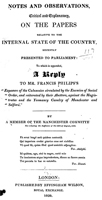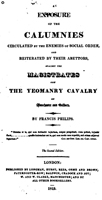
The Peterloo Massacre - Manchester 16th August 1819
TRANSCRIPTION OF : 'NOTES & OBSERVATIONS, Critical & Explanatory, on the Papers Relative to Page 167-171 A REPLY, I know of no law, which authorizes a yeoman to sabre me, because I may not give way to him quite so soon as he wishes that I should. Besides, the density of the crowd, and the suddenness and impetuosity of the irruption of the cavalry, rendered it impossible for the people to open a passage. There is an unconscious simplicity about the remainder of the sentence, which is quite amusing: "a great dust arose, when they (the yeomanry) quickened their speed, so that I could not distinguish all that passed; and certainly, I did not see one person struck with the sabre." (Why not? Mr. Philips shall answer for himself. Because "I could not distinguish all that passed." The letting-off of this negative evidence, reminds me of the story of the Irishman, who, when half a score persons swore, that they had seen him commit a certain theft, claimed to be acquitted upon his trial, because he could produce ten times as many who did not see him: like Mr. Philips, I did not see "one person struck with the sabre," though, it was not the "dust" which prevented it, but a more potent reason; inasmuch as I had left the ground some minutes before the yeomanry came. The number of sabre wounds that I have since seen, is, however, ample proof that many were given. And several persons, whose credibility is to not be impeached, at least, by Mr. Philips's negative evidence, have distinctly sworn, either that they were wounded themselves, or saw wounds inflicted upon others, before the cavalry arrived at the hustings. There is no evidence, which deserves a serious refutation, to prove that any stones were thrown at the cavalry, before they reached the hustings; though it is assumed by Mr. Philips, as a point established, (page 58) that "no lives would have been lost, if opposition had not been made to the civil and military powers." What! did Mr. Ashworth oppose them? Did Mrs. Parkinson oppose them? But I ask for proof, that such "opposition" was made. Mr. Wheeler's story of the "long brats that contain pockets," is too ridiculous to obtain credit; like the parliamentary tales of the two cart-loads of stones, and the thrice-read riot act. lt bears falsehood upon the face of it; for the same money which would purchase "a brewer's brat," would have sufficed to provide some more efficient weapons of offence, than a pocket full of stones. Besides, nothing could give an air of tolerable plausibility to such a preparation, since no reason for it would exist, except an opinion on the part of the people, that they should be attacked. Had they anticipated the probability of that event, they would doubtless, either have come much better prepared for it, or kept at home; believing however, as they did, that their meeting was legal, they could have no expectation of being disturbed. That any person should gravely assert, or, asserting, expect to obtain credit, that an unarmed multitude, amongst whom were many women and children, should attack a body of cavalry, armed with swords and pistols, is indeed to me astonishing. But by what right were the yeomanry brought upon the field? I think I have, in my remarks upon the parliamentary documents, proved, that the meeting was legal. That it was peaceable, I presume, will not now be questioned. If therefore, the object were merely to arrest Mr. Hunt and. his companions, why, but for the very determination to produce the consequences that ensued, were such instruments employed, or such a period chosen? Mr. Hunt might doubtless have been found with ease when the meeting was over, and none of his companions who were named in the warrant, were likely to abscond to avoid its being served upon them; indeed it is morally impossible that they could in any way be aware of its existence. Nor is the execution of a warrant for misdemeanour (the warrant does not, I am assured, allege any distinct fact of illegality,) a matter of such importance as to justify the putting in danger the lives of such an immense multitude of people. But, even if Mr. Hunt and his companions be guilty to the full extent to which crime is imputed to them, I cannot think that the consciences of the Magistrates would have been less at ease, whilst I am sure that the feelings of the country would have been less outraged, if the yeomanry had not been ordered to assault the people; and to arrest Mr. Hunt, without assaulting them, was under the then existing circumstances absolutely impossible. Again, if it were after mature deliberation thought necessary to arrest Mr. Hunt during the meeting, why was not the civil power in the first instance employed? No attempt was made to execute the warrant by its agency, and it would have been thought time enough by any discreet, or humane, or constitutionally disposed persons to call in a military force, when the civil power had been found unable to do its duty, or had been obstructed in the performance of it. Taking, therefore, all the circumstances together, I cannot but conclude, that it was ab initio intended to dissolve the meeting by force, and that the arrest of Mr. Hunt and his associates was merely the pretext by which the attack was to be justified. But, even though the meeting should hereafter be shewn to have been illegal, still it was illegally dispersed. That the Riot Act was not read I haveproved (so far as a negative can be proved) already; and Mr. Philips admits he "did not hear it," but adds that he has " no doubt of its having been read, from the respectable testimony he has heard on that point; but certainly, it was heard only very partially." If Mr. Philips meant, that the country should take his statement as evidence of this fact, he ought to have told us, on the authority of this "respectable testimony, " not merely that the Riot Act was read, but how, where, when, and by whom? The mere assertion, without a full and satisfactory explanation of all these points, is worse than trifling, because it aims at deception; and if the forms and intentions of the law had been complied with, the opportunity of proving that such was the fact, must, I conceive, have been anxiously desired and eagerly embraced. The time has been, that evidence upon that point would have been most beneficial to the Magistrates; but, though the police office has vomited forth its dregs to bear testimony in their favour, the reading of the Riot Act yet remains unproved. It is not necessary for me to repeat the horrifying description of the scenes that ensued after the prisoners were arrested. They can never be obliterated from the memories of those who were fated to witness them. But Mr. Philips justly observes, that "F or any individual to give a correct account of all the circumstances of that eventful meeting, from his own actual knowledge, is im- possihle." As I only witnessed the dispersion of it from a distance, I shall therefore, content myself with stating its results; simply adding, that I can never forget the deep expression of terror and surprise depicted in the countenances of the poor creatures as they ran by me; apparently scarce knowing where they were, or whither they should fly for safety. There are now upon the books of the Committee for the relief of the sufferers, 579 cases ofinjury, sustained on that day. Of these, 421 have already been authenticated by the strictest personal investigation, and the sufferers relieved. Amongst this latter number, there are 161 cases of sabre wounds. In every case in which the name of individuals has been put upon the list of the Committee, the injuries sustained were so severe, as for a greater or less period to render the parties unable to follow their employment. Amongst the wounded are 104 girls and women, and of these, a considerable proportion received sabre wounds, many of which were very serious. Of the parties who were wounded on that day, ten are known to have died, and as is believed in consequence of the injury they sustained. One man, who was severely wounded, has become insane, and one woman, who was also wounded, in a fit of insanity cut her throat. *1 That the number actually wounded was much greater than that which the list of the Committee exhibits, there can be no doubt, because many persons have endeavoured, from an apprehension of personal consequerices, to conceal the circumstance of their having been present at the meeting, Several instances have indeed come under the notice of the Committee, where the knowledge of that fact, by employers, has caused to the poor sufferers the loss of their work. Such then are the immediate consequences-- - such is the direct result, of the glorious victory of the 16th of August, - a victory obtained over whom? over our fellow countrymen and neighbours; the most industrious - the rnost numerous, and the most useful class of our population - that class to whom we owe all our strength in war, from whom we must derive all our prosperity in peace. Hitherto, my opinion of the conduct of the magistrates must be gathered from incidental observations, rather than from any direct or general statement. Of the yeomanry I have not yet spoken; but as Mr. Philips's pamphlet professes to be an exposure of the calumnies circulated, &c. against the Magistrates and yeomanry cavalry of Manchester and Salford; and as I have undertaken the task of answering that pamphlet, my opinion must necessarily be given. That l write under circumstances of considerable restraint, will be sufficiently obvious; It is an ungracious task, at all times, publicly to blame those who are our neighbours and fellow-townsmen; but at the present time to start a doubt of the humanity, of the prudence, of the impartiality, of the constitutional spirit, or of the sound judgment, of the magistrates, will almost be held to be seditious. Footnotes~~~~~~~~~~~~~~ ***************************************************************
'NOTES & OBSERVATIONS, Critical & Explanatory, on the Papers Relative to the Internal State of the Country, Recently Presented to Parliament; to which is appended, a REPLY to Mr. Francis Philips's 'Exposure of the Calumnies circulated by the Enemies of Social Order ...' Transcribed by Sheila Goodyear 2019 LINK to full .pdf document of 'Notes & Observations ...'
on the Internet Archive website to read or download. |
||||||||||||||||||||||||||||||||||||||||||||||||||||||

